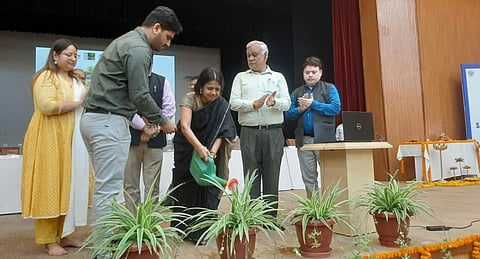

Even as the United Nations has launched a global campaign called ‘Be the Change’ to mark World Water Day, India is already showcasing real action on the ground.
It is already holding up a picture of how big change is possible, Sunita Narain, director general, Centre for Science and Environment (CSE), said while speaking at a national workshop organised in Lucknow to mark World Water Day.
“This is evident in the way states like Uttar Pradesh are tackling the challenge of providing sustainable and inclusive sanitation and water for all,” she added.
The two-day workshop (March 21-22) has been jointly organised by CSE, the department of urban development of the government of Uttar Pradesh and Swachh Bharat Mission, according to a statement by the Delhi-based organisation.
CSE released a series of reports based on ground studies on water and sanitation management in Uttar Pradesh on the occasion.
Uttar Pradesh is the most populous state of India; 95 per cent of its cities and towns are totally dependent on non-sewered sanitation systems. Only 31 towns (out of the 734 in the state) have partial sewerage systems that manage to treat just 40 per cent of the sewage generated.
“This is the reason why sustainable and inclusive scientific management of faecal sludge and septage is a priority for UP. The state’s poor are largely dependent on on-site sanitation systems — therefore, providing an effective and affordable septage management system will generate significant social, environmental and public health outcomes,” Depinder Singh Kapur, programme director-water, CSE, said.
According to Subrata Chakraborty, senior programme manager-water, CSE, “Uttar Pradesh has been moving ahead towards its goal of promoting inclusive sanitation for all. A septage management policy is in place, 59 towns and cities have set up treatment systems, and with the support provided by Centre for Science and Environment (CSE), the towns of Bijnor and Chunar now have fully functional faecal sludge and co-treatment systems in place.”
There are 62 faecal sludge and septage management projects in UP (40 faecal sewage treatment plants and 22 co-treatment plants) — out of this, 36 plants (27 FSTPs and nine co-treatment plants) are fully completed and ready to begin operations as of February 2023.
The installed and under-construction capacity of UP’s septage treatment infrastructure stands at 2,075 kilolitre per day (KLD). The state has committed to establishing a network called “Super 59 Faecal Sludge Management Towns”, as the first step of a long term strategy to promote inclusive sanitation.
Kaushal Kishore, Union minister of state, ministry of housing and urban affairs, underlined the emphasis that the central government has been giving to water and sanitation issues on the inaugural day of the workshop.
Water harvesting, groundwater recharge, rejuvenation of water bodies, and the importance of the role played by sanitation workers were some of the key thrust areas that his ministry was focusing on, he said.
Narain, in her address at the workshop, pointed out that India’s “experience has been invaluable in teaching the world how water management can be reinvented so that it is affordable and sustainable”. The ‘Indian way’, she said, puts water in the hands of communities and is focused on decentralised recharge and reuse.
“Making water everybody’s business is the only way ahead. This is the opportunity — in this decade, we can put all we have learnt into practice and turn around the water-story of India,” said Narain.
She pointed out that this was “even more important in today’s climate-risked world. We must scale up our work to invest in water systems and make them durable, not just to withstand another rain, but another deluge. We need to speed up our work, because climate change will make sure that we have more rain, but in fewer rainy days. This means doing much more to capture the rain, when and where it falls so that groundwater is recharged.”
Narain added: “For a country like India, the issue of water is not about scarcity but about its careful use and about its equitable and distributed access. How we manage our water resources would determine if we remain poor or become rich; diseased or healthy. In other words, water is the determinant of our future. Water management strategies will need to be carefully designed so that they lead to distributed wealth generation.”